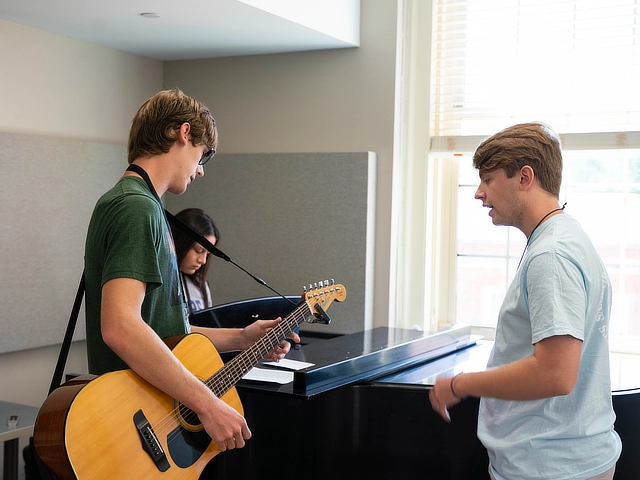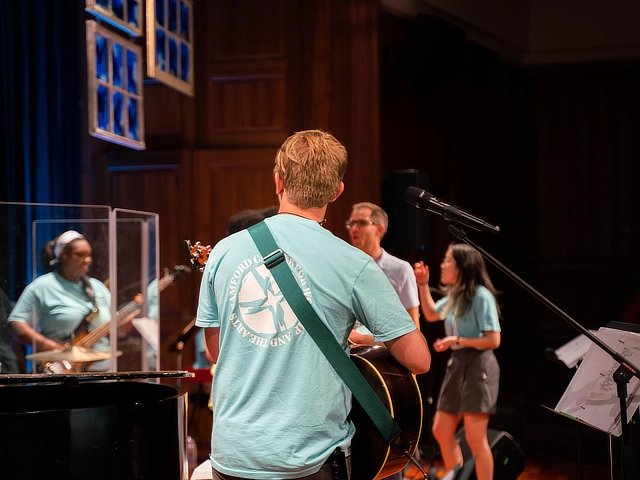
One of the most important life truths I learned as a teenager was that “prior planning prevents poor performance.” This maxim has proved to be wise counsel over my twenty years as a musician and worship minister. When I consider how many services I have led in that time, I shudder to think how they would have gone without proper prior planning. During this time, I have also discovered that each church has its own culture and interpersonal staff dynamics that inform the worship planning process. Additionally, it is also easy to get into a planning rut as we look across the calendar to Sunday week after week. Considering these challenges, I want to offer some very simple suggestions for planning and preparing worship.
First, establish a regularly scheduled planning meeting. Some teams meet weekly, while others meet once or twice a month. The key is to schedule these meetings at a consistent, recurring interval. Two key words should guide your work: collaboration and coordination. You want to collaborate with key stakeholders in the worship gatherings, and you want to coordinate your efforts. Assuming that you are leading the meeting, be sure to invite your pastor to attend along with key staff positions and/or ministry leaders, even volunteers or musicians. Make sure to decide and communicate whether the meeting will be a creative meeting that brainstorms ideas or a logistics meeting that discusses details for a planned service; it can be both. Depending on the frequency of when you meet, plan out the service for the next two weeks, month, or two months. In my experience, my team would usually work out logistics for the next 1-2 weeks of services and then generate ideas for services in 3-5 weeks. No matter what you decide, take time to discuss the purpose, focus, content, and flow of weekly worship gatherings. It goes without saying but be sure to start the meeting by spending time in scripture and prayer—maybe even sing together. Ask God to guide and direct every step of your planning and preparation.

An essential resource for planning and preparing worship is a shared worship planning document. On this document you can sketch out multiple weeks in advance and keep a running list of ideas for future services as well as key elements in services (baptism, communion, mission emphases, etc.). Be sure to also include certain themes, songs, personnel/leaders, etc. You can do all this with an online planning management software like Planning Center Online©. These tools help get everyone on the same page (literally) by providing efficiencies with communication, resources, and scheduling.
Finally, we likely all agree that consistent, weekly rehearsals are essential. These times should be used to prepare leaders musically and spiritually, and I stress the importance of spiritual preparation. We must rehearse and prepare our hearts even as we prepare our heads and hands. If others are like me, I can focus heavily on trying to prepare music on a limited rehearsal schedule and neglect time in prayer, encouragement, and discipleship. It is hard to tend to these shepherding responsibilities in every rehearsal but make it a priority to spend time on more than the music, even if you must lengthen your weekly rehearsal. Those minutes will yield dividends over the long term. Here are a few practical steps for getting the most out of your rehearsals:
- Prepare for a rehearsal like you prepare for a service. Define your goals at a 30,000 ft view and at a granular level. Allocate how you want to spend every minute of rehearsal.
- Have all team members placed and functioning in their assigned roles as if it were the actual service (tech team, screen/computer operators, etc.)
- Communicate the schedule and plan for rehearsals in advance, including start time. Make a point to say that the start time is when the music making begins (not getting out instruments, getting microphones, finding stage positions, picking up music, etc.)
- Start on time. Nothing kills a leader’s credibility and overall team attitude more quickly than when people sense their time being wasted. If you do start late, don’t go late to make up for it. This alone will build immense trust and relationship capital over time.
- Prepare all scores, charts, recordings, service orders, etc. and make these available before rehearsal—at least 48 hours in advance. Have every resource accessible to empower team members to do their very best.
- Know every detail of the music and service order. Know what every person/position is supposed to be singing or playing. If you don’t know this, how can you tell if team members are leading their part correctly?
- Think through and communicate all service logistics, especially transitions between each element and movement of individuals on/off the platform. Those are the finishing touches that deliver an impactful and coherent service.
- Make sure to have a personal touchpoint with as many team members as possible before or after rehearsal. Design a schedule so that you don’t have to hurry into or out of rehearsal. At least over a month of rehearsals, make sure to have a “sidebar” conversation with every team member (small to medium size teams).
In all these things, the goal is to be faithful in stewarding church resources well—resources that include time, money, and, most importantly, people. Through our planning and preparation may we pursue what John Piper calls an “undistracting excellence” that leads people to encounter the greatness and glory of God.
Jonathan Rodgers is Area Coordinator of Music and Worship, Director of the Worship Arts Ensemble, and Faculty Fellow for The Center for Worship and the Arts at Samford University. He has been directing choirs in schools and the church for over fifteen years. As a clinician and presenter, Rodgers has been a guest conductor for honor choirs throughout the Southeast. Currently, he is serving as Minister of Music and Worship at Liberty Park Baptist in Birmingham, Alabama. Prior to this position, Rodgers was Minister of Music and Worship Arts at Hunter Street Baptist Church, and prior to that, Assistant Professor of Choral Music at Lee University in Cleveland, Tennessee. In addition to his conducting and scholarly activities, Jonathan is an active pianist, church musician, and composer. Jonathan has been married to his his wife Alicia for seventeen years, and they have four children: Savannah, Leighton, Brooks, and Gabe.
